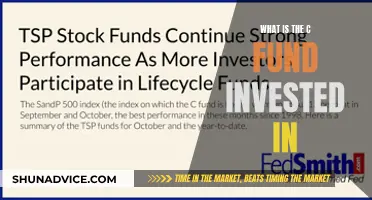
Index funds are a type of fund designed to track the performance of markets and indices, such as the FTSE 100 or S&P 500, and can be a good way to begin investing in the stock market. They can be incorporated into a Stocks and Shares ISA tax wrapper and are often available at a low cost. They are also a passive form of investing, meaning they track the stock market to gain returns that are in line with the current stock market price. This means they are a long-term investment with lower fees. However, they are still a risky investment, and the stock market is prone to volatility.
| Characteristics | Values |
|---|---|
| Type of fund | Designed to track the performance of markets and indices internationally or on a country-by-country basis |
| Investment type | Mutual fund |
| Investment vehicle | Stocks and Shares ISA |
| Investment strategy | Long-term |
| Investment risk | Low |
| Investment diversification | High |
| Investment accessibility | Low minimum investment amounts |
| Investment fees | Low |
| Investment returns | High over a long period of time |
| Investment transparency | High |
What You'll Learn

Index funds vs. active funds
Index funds and active funds are two different types of investment funds with distinct characteristics and risks. Here is a detailed comparison between the two:
Nature and Objective:
Index funds, also known as passive funds or tracker funds, aim to replicate the performance of a specific market index, such as the FTSE 100 or S&P 500. They buy shares in every company listed on the index or a representative sample of shares. The goal is to provide investors with exposure to a diverse range of companies and industries, offering long-term returns without the need for active stock analysis and selection.
On the other hand, active funds aim to outperform a particular index or market. Analysts and stock pickers actively research and make decisions about which companies, countries, regions, or industries to invest in. Active funds involve building a portfolio that deliberately differs from the overall market, with the goal of achieving higher returns.
Risk and Returns:
Index funds are considered less risky due to their diversification and lower fees. By tracking an index, they provide consistent, long-term returns without the need to take on additional risk.
Active funds, on the other hand, offer the potential for higher returns but also carry greater risk. They may target specific companies or sectors, which can lead to higher volatility. Additionally, active funds tend to have higher fees, as they involve more frequent buying and selling of underlying investments, increasing costs for investors.
Fees and Costs:
Index funds are known for their low fees, as they do not require the same level of active management as active funds. Lower fees can result in higher returns over the long term, as there are fewer costs eating into investment gains.
Active funds, in contrast, typically come with higher fees to cover the cost of fund managers, analysts, and stock pickers. These higher fees can impact long-term returns and may require stronger performance just to break even.
Suitability:
Index funds are suitable for investors seeking a simple, low-cost, and diversified investment option. They are a good choice for those who want exposure to a broad range of companies and industries without the need for active management.
Active funds, meanwhile, may appeal to investors who are willing to take on more risk in pursuit of potentially higher returns. They are suitable for those who believe that active management can outperform the market and are comfortable with the associated fees and potential for underperformance.
In summary, the choice between index funds and active funds depends on an investor's risk tolerance, investment goals, and preferences for active versus passive management. Index funds offer diversification and low fees, while active funds aim for higher returns but carry greater risk and costs.
IRA and Mutual Funds: A Smart Investment Strategy
You may want to see also

Index funds and tax
Index funds are a type of mutual fund that tracks the performance of markets and indices. They are traded when the markets close and often have higher minimum investment amounts than ETFs. They can be bought in £ or $ increments.
When considering how and where to invest in index funds, it is important to be aware of the tax implications. Any profits made from investments will be subject to tax unless you are trading within an individual savings account (ISA) or self-invested personal pension (SIPP). Both of these options can be used to shelter your investments from tax.
If you are investing outside of an ISA or SIPP, the amount of tax you pay will depend on your personal tax situation and the amount of profit made. You may be taxed on income through dividends or interest payments, and you will need to pay capital gains tax (CGT) on any profits made from selling investments that have increased in value over time. The tax rate will depend on your income tax band and allowances.
It is worth noting that ETFs (exchange-traded funds) are generally more tax-efficient than equity index funds. However, the tax treatment of ETFs can be complex and depends on various factors, including the ETF's reporting status and whether it is held in an ISA or SIPP.
To make the most tax-efficient investment decisions, it is recommended to consult a tax adviser or financial professional for specialist advice. They can guide you on which options are best suited to your individual circumstances and help you navigate the tax landscape.
Investing Now: Choosing the Right Funds for Your Portfolio
You may want to see also

Index funds vs. ETFs
Index funds and ETFs (exchange-traded funds) are two of the easiest ways to begin investing in the stock market. They are similar in that they are both passive products designed to track the performance of a financial market or sector, such as the stock market. They can also outperform higher-risk investments in the long term and remove the hassle of picking specific stocks. However, there are some key differences between the two.
Firstly, index funds are a type of mutual fund, meaning that they pool money from multiple investors to buy securities. In contrast, an ETF is your own fund in your investment portfolio. ETFs are also traded throughout the day, whereas index funds are traded when the markets close. This makes ETFs more liquid than index funds, as investors can more easily convert their assets back into cash.
Index funds often have higher minimum investment amounts than ETFs. They can be bought in £ or $ increments, whereas ETFs are bought by share quantity. ETFs are also more tax-efficient than equity index funds.
Both ETFs and index funds are passively managed, meaning they require minimal input and management. This makes them low-cost and low-maintenance investment options. However, it also means that they are not usually suitable for short-term investing, as they mirror market performance and therefore may not bring quick benefits or returns. Additionally, as passive products, they can never beat the market.
Vision Fund's WeWork Investment: A Bold, Early Move
You may want to see also

Index fund risks
Index funds are a passive investment option that tracks the performance of a particular market index, such as the FTSE 100 or S&P 500. While they offer a convenient and low-cost way to gain exposure to a diverse range of shares or bonds, there are several risks associated with investing in index funds. Here are some key points to consider:
Lack of Protection
Index funds closely follow the performance of the stock market, which is subject to fluctuations. When the market performs well, index funds can provide attractive returns. However, during market downturns, investors may be exposed to significant losses. It's important to remember that the value of your investment can decrease, and you may get back less than you initially invested.
Lack of Flexibility
Index funds are designed to mirror a specific index, and investors have limited flexibility to change the underlying index. If you anticipate a decline in the value of the tracked index, your only option is to sell your holdings. You cannot modify the composition of the index to mitigate potential losses.
Limited Control
Index funds typically do not have a fund manager, which means you have little to no control over the specific investments within the fund. The performance of your investment is directly tied to the performance of the underlying index, and you must accept the associated risks.
Emotional Stress
Investing in index funds can be emotionally challenging, especially during periods of market volatility. As the value of your shares fluctuates, you may find yourself constantly monitoring market performance, which can lead to stress and anxiety. Making investment decisions based on emotions rather than logic can be detrimental to your financial goals.
Underperformance Relative to Active Funds
Index funds aim to replicate the performance of a chosen index, and by design, they will not outperform the market. If you are willing to take on more risk and pay higher fees, active funds managed by investment professionals might be a more suitable option as they aim to beat the market returns.
Concentration Risk
In recent years, a small group of large companies, often referred to as the "Magnificent Seven," have come to dominate major market indexes like the S&P 500. This concentration poses a risk to investors in index funds as a significant portion of their portfolio is tied to the performance of these few companies. If these companies underperform or face challenges, it can disproportionately affect the returns of the index fund.
Key Factors for Investors to Consider in Mutual Funds
You may want to see also

Choosing an index fund
Index funds are a type of mutual fund that tracks the performance of markets and indices. They can be incorporated into a Stocks and Shares ISA tax wrapper.
When choosing an index fund, it is important to consider your goals, risk appetite, fees, and investment time horizon. Here are some key factors to keep in mind:
Investment Goals and Risk Appetite
Determine your investment goals and how much risk you are comfortable with. Index funds can be a good option for those seeking long-term investments with broad market exposure and lower fees.
Fees
Index funds typically have lower fees compared to actively managed funds because their portfolios rarely change, resulting in reduced trading costs. However, it is important to consider the annual fee and any transaction fees associated with buying or selling the fund.
Time Horizon
Consider the length of time you are willing to invest your money. Index funds are generally suitable for long-term investments, as they aim to track the performance of the market over time.
Diversification
Index funds provide instant diversification by allowing you to invest in a pool of money to purchase a wide range of assets in the stock market. This reduces the risk associated with investing in individual stocks.
Flexibility
Index funds lack flexibility as they track a specific index, and investors cannot change the index being tracked. Additionally, fund managers cannot sell underperforming stocks, which may impact the overall performance.
Performance
Index funds deliver the same returns as the chosen index. If the tracked market index increases, the value of the shares in the fund will also increase, and vice versa. However, it is important to remember that index funds cannot outperform the index they are tracking.
Company Size, Geography, and Industry
Index funds track various indexes based on company size, geography, or industry. Consider the type of company you want to invest in and choose an index fund that aligns with your preferences.
Popular Index Funds in the UK
Some popular index funds in the UK include the iShares Core FTSE 100 UCITS ETF, which tracks the FTSE 100, and the Vanguard 500 Index Fund, which tracks the S&P 500.
Debt Fund Investment: Timing and Strategy
You may want to see also
Frequently asked questions
An index fund is a type of mutual fund or exchange-traded fund (ETF) that tracks the performance of a financial market index, such as the FTSE 100 or S&P 500. Index funds aim to match the market performance of their chosen index as closely as possible and typically offer broad market exposure at a low cost.
Index funds provide instant diversification, allowing investors to buy slices of many companies at once. They are also relatively low-cost, simple to understand, and can offer better returns than actively managed funds over the long term.
As with any stock market investment, there is a risk of losing money when investing in index funds. Index funds lack protection and flexibility, and investors have little control over their portfolio. Additionally, investing in index funds can be stressful, especially during volatile market periods.
When choosing an index fund, consider your financial goals, risk tolerance, fees, and investment timeframe. Different index funds track various indexes based on company size, geography, industry, and asset type, so select one that aligns with your investment strategy and preferences.
You can invest in index funds through an online investment platform, mobile trading app, or a financial advisor. You can also buy directly from fund manager providers. To invest tax-efficiently, consider using a Stocks and Shares ISA, where holdings are sheltered from dividend tax and capital gains tax.







